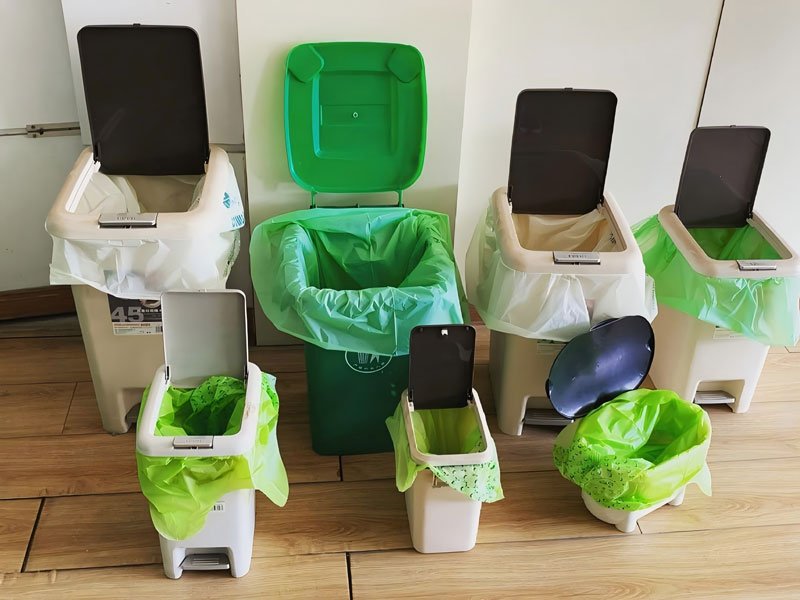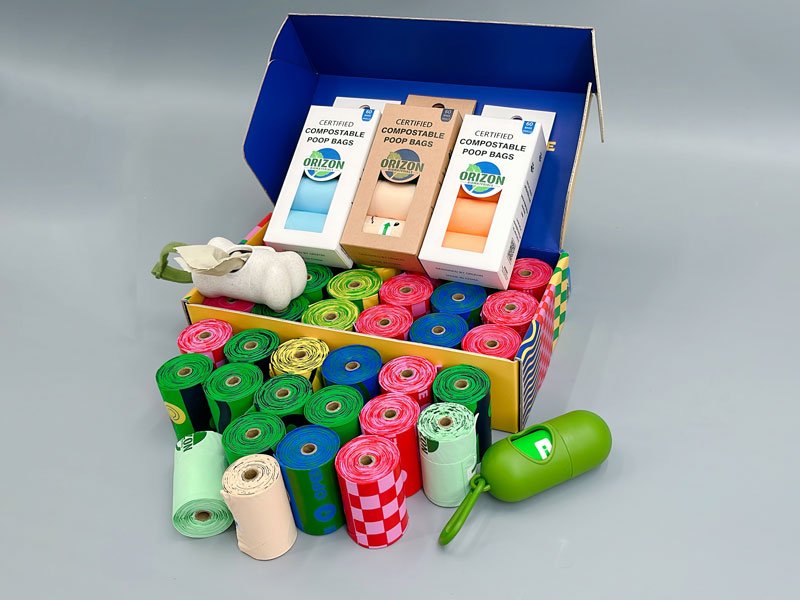The commercial sector (restaurants, offices, and retail stores) generates a large amount of organic waste every day. Landfill is a huge undertaking and traditionally has a significant impact on the environment.
Commercial composting offers an effective solution that converts organic waste into nutrient-rich compost while reducing reliance on landfills.
This guide explores how commercial composting works, its benefits to businesses, and how compostable trash bags can simplify sustainable waste management options.

What Does Commercially Compostable Mean
Commercial composting, also known as industrial composting, is the large-scale processing of organic waste in specialized facilities. Unlike small-scale and slow yard composting, commercial composting uses advanced technology to speed up decomposition and can handle large amounts of food scraps, yard waste, and compostable packaging.
Materials such as compostable trash bags made from corn starch or PLA (polylactic acid) are ideal for collecting organic waste without contaminating the composting stream. The process is the cornerstone of compostable waste management, turning waste into valuable compost that can be used in agriculture or landscaping.
Importance of Commercial Composting
- Environmental Impact: Diverts organic waste from landfills, reducing methane emissions—a potent greenhouse gas. It also enriches soil with nutrient-rich compost.
- Economic Savings: Businesses can lower waste disposal costs, as composting is often cheaper than landfilling. Some facilities even sell compost for revenue.
- Regulatory Compliance: Cities like San Francisco and Seattle have mandatory green bin programs, requiring businesses to compost organic waste.
- Brand Reputation: Adopting green business practices enhances a company’s eco-friendly image, appealing to environmentally conscious customers.

How Does Commercial Composting Work
- Collection: Organic waste, such as food scraps or yard trimmings, is collected in compostable bin liners certified for industrial facilities.
- Sorting: Facilities remove non-compostable contaminants (e.g., plastics) to ensure a clean compost stream.
- Decomposition: Waste is processed in controlled environments with optimal heat (120–160°F), moisture, and oxygen, breaking down materials in 4–12 weeks.
- Output: The result is nutrient-rich compost used for agriculture, landscaping, or soil remediation.
Compostable bin liners certified to standards like ASTM D6400 or EN13432 ensure compatibility with this process, breaking down fully without leaving toxic residues. Factors like temperature, material type, and facility conditions influence decomposition speed.
Benefits for Businesses
- Cost Efficiency: Composting often costs less than landfill disposal, especially in cities with high landfill fees.
- Sustainability Goals: Using compostable waste management aligns with corporate sustainability targets, boosting brand credibility.
- Regulatory Alignment: Complies with local green waste regulations, avoiding fines in cities with mandatory composting laws.
- Employee Engagement: Involving staff in green business practices fosters a culture of environmental responsibility.
Restaurants, offices, and retailers can use compostable bin liners to simplify organic waste collection, ensuring compliance and efficiency.
Challenges of Commercial Composting
- Limited Infrastructure: Only 15% of U.S. composting facilities accept compostable packaging, limiting access in some regions.
- Contamination Risks: Non-compostable materials, like plastic bags, can ruin compost batches, requiring careful waste sorting.
- Education Needs: Staff must be trained to use compostable bin liners correctly and avoid mixing non-compostable waste.

How to Implement Commercial Composting
- Assess Waste Streams: Identify organic waste (e.g., food scraps, coffee grounds) and estimate volumes.
- Partner with a Facility: Contact local industrial composting facilities to understand their requirements and services.
- Use Certified Liners: Choose compostable bin liners with certifications like BPI or ASTM D6400 for seamless integration.
- Train Employees: Educate staff on proper waste sorting and the use of compostable trash bags.
- Monitor and Optimize: Conduct regular audits to ensure compliance and improve efficiency.
Key Certifications for Compostable Materials
- EN13432 (Europe): Ensures materials break down in industrial composting facilities within 6 months.
- ASTM D6400 (USA): Verifies safe decomposition with no toxic residues.
- BPI Certification: A U.S. standard for compostable products, widely recognized by facilities.
- OK Compost / OK Compost Home: Confirms suitability for industrial or home composting.
These certifications prevent greenwashing and ensure compostable bags perform as promised in commercial composting facilities.
Who Can Benefit from Commercial Composting?
Commercial composting is ideal for:
- Restaurants and Cafes: Manage high volumes of food waste composting from kitchen scraps.
- Offices: Reduce waste from break rooms and cafeterias using compostable trash liners.
- Retail and Grocery Stores: Handle organic waste and compostable packaging from produce sections.
- Event Venues: Process waste from large gatherings with green bin compatibility.
These sectors can leverage sustainable waste solutions to meet environmental goals and comply with green waste regulations.

Tips for Choosing Compostable Trash Bags
Certification: Choose trash bags that meet ASTM D6400, EN13432, or are BPI certified to ensure they are compatible with green trash bins.
Size and strength: Choose trash bags that match the size of your trash bin (e.g. 10L for a small trash bin and 30L for a kitchen trash bin), and make sure you use leak-proof compost bags for wet trash.
Reputable suppliers: Buy from trusted manufacturers to avoid non-compliant products.
These tips will ensure your compostable trash bags meet industrial composting standards and operate reliably.
Where to Start Commercial Composting
First steps:
Research local facilities: Check out nearby industrial composting facilities and their material requirements.
Contact waste suppliers: Work with waste management companies that offer compostable waste management services.
Invest in trash bags: Stock up on BPI certified trash bags to streamline the collection process.
Staff training: Train staff on waste management strategies and proper disposal methods.
These steps make commercial composting easy and effective for any business.
Conclusion
Commercial composting is a cornerstone of sustainable waste solutions that can reduce landfill waste, lower costs, and promote green business practices. By using certified compostable trash bags that meet standards such as ASTM D6400 or EN13432, companies can simplify organic waste management and comply with green waste regulations. With growing consumer demand for sustainability and increasingly stringent regulations, adopting industrial composting is a smart move. Partner with your local mill today to choose certified compostable trash bags for a greener future.


